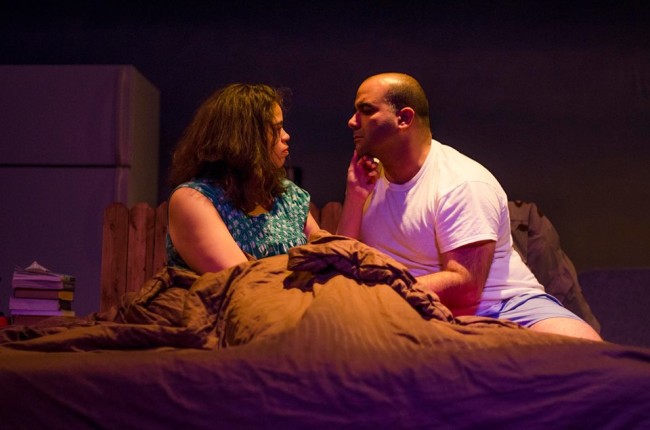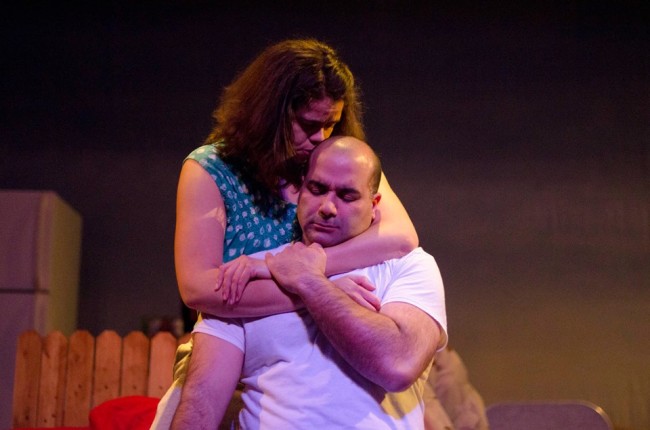The universe is an optical illusion. Domesticity verses wildlife; the age-long endless battle of which is natural and which is right. Single Carrot Theatre investigates this controversial topic with their production of Josè Rivera’s References to Salvador Dalì Make Me Hot. Directed by Steven J. Satta, this surrealist work based in reality with hints of magical realism and dream-escapism lives up to the standard of the typical Carrot productions: making you think whilst spinning you about in blissful confusion. Though more linear than many of the productions witnessed at STC, this unique performance is not without its time quirks and character eccentricities. A provocative work that turns up the heat physically, emotionally, and intellectually; this production kicks off the back-end of the company’s eighth season with a steamy bang.
Scenic Designer Samantha Kuczynski drags the Mojave right to center stage. A symbolic magical strip of Route66 runs right through the center of stage. This is a perfect representation of the script’s hybrid existence between reality and fantasy as an otherwise normal household in Barstow, California exists around the chunk of highway. The duality that Route66 runs right through life in that isolated part of the desert is not missed by theatergoers noting its central placement on the stage. Kuczynski has an endless horizon of desert for a backdrop, again highlighting themes of the play in her design work. The unique thing about Kuczynski’s overall concepts is the dismantling of scenes. Once each scene is passed through the furniture is upended onto its side and left in plain sight as if to represent different pieces of reality animated and deactivated by the story’s natural path the way nature brings life and death to the path it carves in the world.

Costume Designer Julie Potter adheres to minimalism, especially when it comes to the surreal characters. Coyote and Cat, for example, have simple fur collars to delineate their wild tendencies and domestic practices respectively. Potter outfits the moon in sheer and simple white so that he appears to glow from atop the refridgerator. These choices allow the audience to focus less on the construct of anthropomorphized characters and more on what they represent to the play as a whole. While Potter’s work enhances the production, Lighting Designers Alec Lawson and Rachel Fraczkowski muddle the intensions of the work in their designs. Fraczkowski and Lawson light the hot and heavy bedroom scene in red; a trite move particularly when the scene leading up to that is spent talking about the full moon and its illustrious bright glow. There is also a striking moment when Gabriela begins to expound on her horrific dream and the lighting tosses both her and Benito into a strange disjointed shadowy lighting which detracts the audience from the telling of the dream rather than drawing them into its essence.
Director Steven J. Satta draws the playwright’s focus of domestic and wild parallels to the human characters. Rivera makes a blatant comparison between the wild Coyote (Nathan Fulton) and the domesticated Cat (Heather Peacock) juxtaposed against the domestic military wife Gabriela and her home-from-war husband Benito. Rivera’s point would be just as easily conveyed without the trappings of magical realism in the opening scene that has Peacock and Fulton’s characters carrying on in a showdown of sorts over who has the better lifestyle. While these two actors under Satta’s skilled direction create dynamic portrayals of these animals their overall purpose in the show feels redundant in regards to illustrating the main theme.
Martin (Sam Hayder) is another character that feels like more of a device than a thoroughly developed individual. Hayder’s performance is entertaining; eager and full of quipped wit that brings a hint of comic relief to a darker subject matter. His emotional outburst near the end of the second act, which feels extraneous to the rest of the plot as a whole, is delivered with solidarity and comes from a churning core of raw emotions deep within Hayder’s wheelhouse. His energetic youthful portrayal does draw a strong contrast to Benito (Kaveh Haerian) lifestyle and the way the military has aged and warped his character.
Haerian plays first the moon; deliciously inconstant as Shakespeare wrote him. Saucy and yet serene, observer and meddler; Haerian imbues the moon with a phosphorescence that seems to both augment and contradict the character’s existence in the play. Playing as Benito, Haerian brings a much different energy to the war-torn character; an inexcusably rough and guarded masculinity that is crass and sexual. His emotional restraint with this character is impeccable; bombastic bursts of feelings that come flying out of nowhere after forcing it all down inside of him. The retelling of his war trauma becomes a truly harrowing moment in his hands.

Haerian’s Benito character finds secondary definition in his wife, Gabriela (Jessica Garrett)’s eyes. Garrett gives a dynamic performance that at times is a bit scattered and spread pell-mell as if all the pieces of her conscious have never met on one plane of existence. Surging onto the scene with a thunderous, albeit maniacal, energy for her character’s opening appearance, Garrett does not maintain this constant flow of internal motion. Her emotional rants are deeply felt. The volatile chemistry between Garrett and Haerian is titular; gripping moments of struggle both emotional and physical where Haerian arises the victor; the stronger of the two in every scene.
The show tackles a great deal of thought-provoking topics, particularly in regards to the way war and conflict can evoke the inner savage animal from the depths of our domesticated human existence. Despite its bizarre blend of surrealism and magical realism, the performance is well done and creates a unique and evocative theatergoing experience.
Running Time: Approximately 2 hours with one intermission
References to Salvador Dalì Make Me Hot plays through February 8, 2015 at Single Carrot Theatre— 2600 N. Howard Street in Baltimore, MD. For tickets call the box office at (443) 844-9253 or purchase them online.

